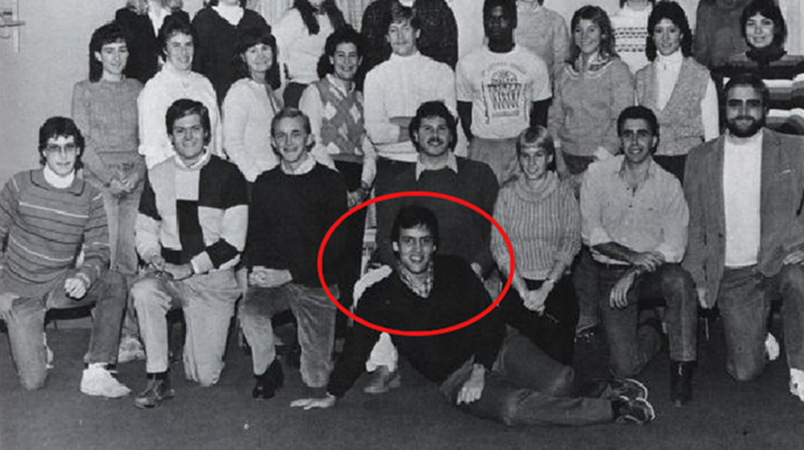New Jersey Gov. Chris Christie (R) is no stranger to accusations of political bullying and backroom dealing like those at the heart of the bridge scandal.
TPM has found one of the first times the brash political brawler faced such claims was in the mid-1980s when he was an undergrad at the University of Delaware.
There, student newspaper archives show, Christie was accused of establishing a college political machine that rewarded his friends and drove his classmates out of student government. One fellow student even wrote to the paper to decry Christie’s “cronyism” and question the legitimacy of the future governor’s reign.
The accusations have have relevance anew now that the potential 2016 presidential contender is facing the biggest turmoil of his career with the uproar over the George Washington Bridge. Democrats in New Jersey have accused members of Christie’s administration of using their power to close lanes on the bridge, causing a traffic jam in the town of Fort Lee, N.J. as revenge against the mayor there. Christie’s office did not respond to a request for comment.
Christie was voted president of the Delaware Undergraduate Student Congress in 1983, ahead of his senior year. He ran in the race on his own line, the Campus Action Party, which had a slate that featured his future wife, Mary Pat, running for DUSC secretary. In its May 10, 1983 issue, the campus newspaper, The Review, reported Christie’s Campus Action Party “swept” the elections “capturing all six positions” in the student government body.
As president, The Review praised Christie for his efforts to expand the commencement ceremonies and establish a student activity fee. However, the paper also contained hints of the rougher side of his leadership.
In April 1984, the race to succeed Christie began. Though he was leaving the school, Christie and his allies clearly maintained a firm grip on the student government.
Christie’s younger brother, Todd, was “chairman of the election committee,” and his future wife, Mary Pat, ran to follow in Christie’s footsteps as president. Mary Pat was unopposed. In an interview with The Review, she suggested other students were afraid to run against her because of Christie’s strong record.
“People might have looked at the success that we accomplished in this year and felt that the ticket was too strong to beat,” said Mary Pat.
For his part, Christie expressed surprise his party went unopposed.
“You could have blown me over with a feather when I found out no one was running,” he told the paper. “We’re not having an election this year, we’re having a coronation.”
In an interview after Mary Pat’s victory, Christie characterized the lack of a challenger as a sign of “silent approval” for his administration.
Though Christie and his future wife seemed to indicate the lack of opposition was beyond their control, others apparently felt there were more sinister forces behind their dominance. In a letter published in the April 27, 1984 issue of the review entitled “Christie cronyism,” a self-described DUSC member named Richard Abbott suggested Christie’s undemocratic tactics drove others away from student government.
“‘Cronyism’ in DUSC has caused frustration and disgust of many hard working members, and led to the resignation of five voting members by mid-year. WHY?” Abbott wrote. “When a member perseveres in his or her student government work, and then witnesses the appointment of the president’s friends or even his brother to committee chairmanships one begins to wonder about the legitimacy of DUSC.”
Abbott went on to suggest Christie’s tactics had allowed him to control student government votes.
“Something is lacking in our student government. It is known as representative democracy. Mr. Christie and his executives were able to appoint a surrogate as Nominations Chair, and this chairman then had the power to appoint committee chairmen,” wrote Abbott. “Therefore, Chris Christie’s deputies, chairmen and fellow Campus Action officeholders, could constitute a majority of the voting members of DUSC. That is not democracy.”
Christie does not seem to have responded to Abbott’s argument in the pages of The Review. However, a former DUSC member named Steven Vaughn wrote a rebuttal that was published in the May 1, 1984 issue. In his letter, Vaughn described Christie as one of his “trusted friends.” He also indicated he was one of the five DUSC members who resigned and said Abbott had “no idea” why he did so.
Vaughn’s letter also included something reminiscent of modern day Jersey politics — an off-color insult aimed at his rival.
“I wish to publicly chastise Mr. Abbott,” he wrote, “for talking through means other than his mouth.”
Photo shows Chris Christie in front of the DUSC via Blue Hen Yearbook 1984.










